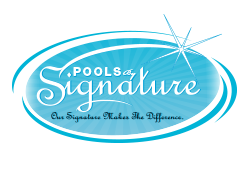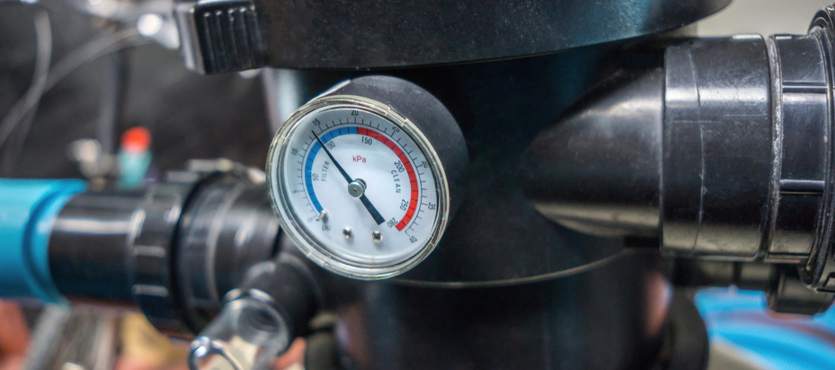If your pool water looks cloudy or dirty despite the pump running, it’s a clear sign that the filter isn’t working. There might be a blockage in the system or a singular part that needs to be fixed. Although, in some cases the entire pump may need to be replaced.
The Importance of Your Pool Pump
Your pool pump is responsible for keeping your pool clean. It uses a motor-driven device that sucks pool water in through a collection of pipes, pushing them into a skimmer that traps the largest debris and then moves remaining debris into a filter meant to trap smaller particles. It then pushes the clean water back into the pool. That’s why the first sign that your pool pump isn’t working properly is that your pool is looking dirty.
5 Signs Your Pool Pump Isn’t Working
1. Pool water is dirty despite running pump
The most common sign the pool filter is not working is if the pool is cloudy or dirty despite continually running your pool pump.
2. The pressure gauge reads >12 psi
Your pressure gauge, located on the side of the filter, should read between 12 and 17 psi (pounds per square inch). If your gauge reads below 12 psi, it’s important to find the underlying cause of this low pressure.
3. Still not working after backwashing the filter and cleaning the skimmer basket
To make sure the filter is not your issue, you can backwash the filter to clean it of dirt and debris. A clogged filter could cause a low-pressure gauge reading. In addition, clean out the skimmer basket, which is located on the side of the pool, along with any filter baskets interconnected with your pump system. These baskets are at risk of getting clogged, which can interfere with the flow of water and reduce water pressure.
4. It is leaking water
Leaks beneath your pool pump are often caused by a pressure-side leak. If there is a leak, your pool pump may start to suck in air – which is problematic.
5. It’s making weird noises
If you notice your pool pump is screeching, or sounds like it’s full of rocks, it might be because it needs more water. Check the suction lines to ensure too many of them are not closed off. In addition, check the skimmers to make sure they are not clogged with debris.
In some cases, the issue relates to a pool pump that is too powerful for the pool it is tasked with cleaning. If this is the case, you may need to downgrade your pool pump. Another common cause of a loud pool pump is worn bearings. There may be something stuck in the impeller if it is making a humming noise.
How Long Do Pool Pumps Last?
The average pool pump will last around eight to twelve years before it needs to be replaced.
Certain factors will influence how long your pump will last:
- The size of the pump
If a pool pump is too small for the size of the pool it is forced to work much harder to keep up, running more often and therefore decreasing the pump’s lifespan.
- Type of pump
In general, there are two different types of pumps; single speed and variable speed. Single speed pumps are cheaper, but they only run at one speed – a high power speed that causes them to wear down faster. Variable speed pumps give you more variety with a range of speeds to choose from. Since you can pick between slow and fast speeds, the pump runs more efficiently and tends to last longer.
- How well you keep up with maintenance
While the entire pump will not need to be replaced for years, smaller components of the pump will need upkeep in that time to prevent larger issues from popping up. For instance, screws, sealants and O-rings will need to be replaced. The quicker you fix these issues as they arise, the less likely they are to spiral into larger issues.
You Can Count on the Pool Pump Experts
We can fix any issues impacting your pool pump! Contact Pools By Signature today for fast and affordable help you can count on.

